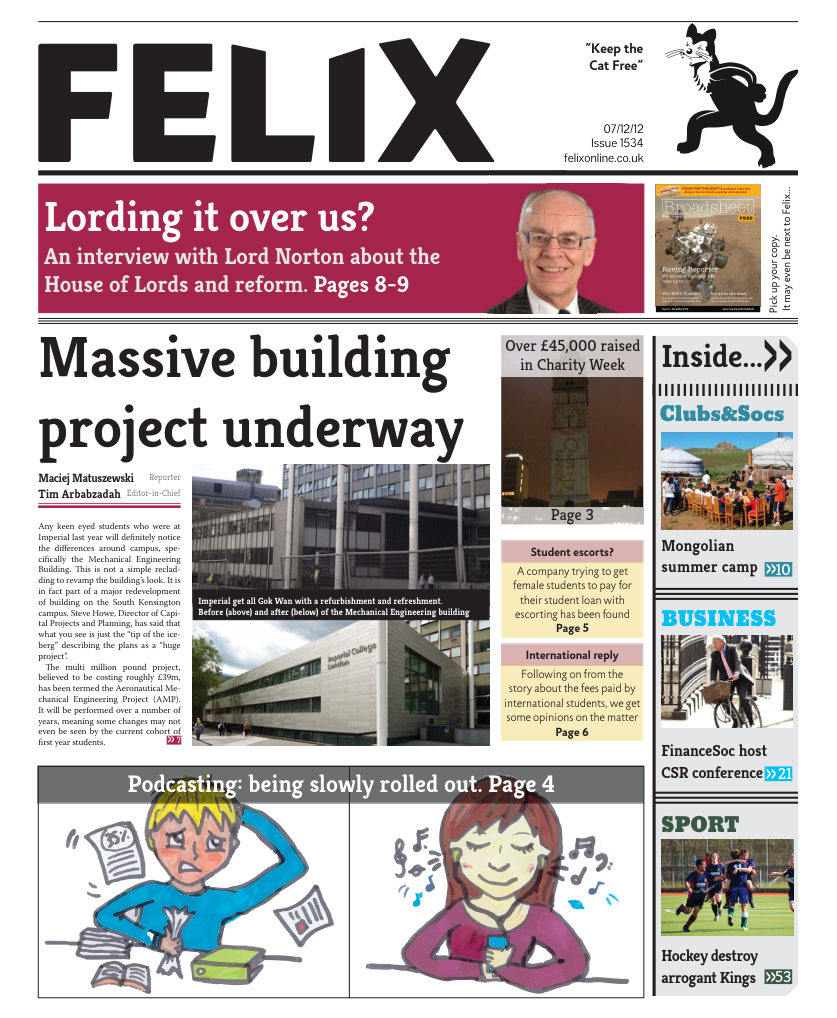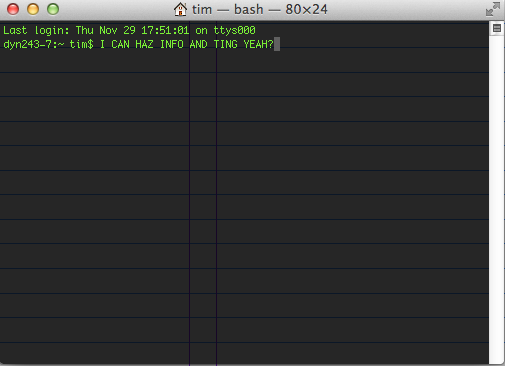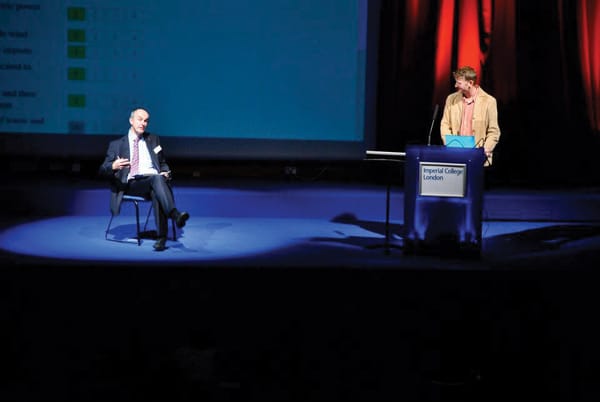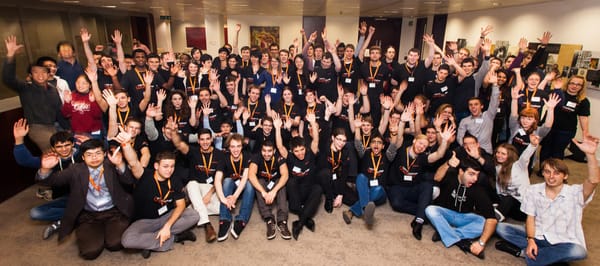A Lordable conversation
Alex Morton interviews constitutional expert Lord Norton about constitutional reform

Alex Morton: Thank you very much for giving up your time this afternoon Lord Norton. Could you briefly explain the principal functions of the House of Lords, and why it matters?
Lord Norton: It matters because it is the second chamber, and because it is not elected it is complimentary to the first chamber, and that is what gives it its value as it’s neither duplicating nor challenging the elected first chamber. It adds value by pursuing tasks that the first chamber doesn’t have the time, the political will, or it may not have the resources. Its principal tasks are legislative scrutiny, different from the Commons, which focuses particularly on the principle – so if you like, the ends of legislation – we don’t seek to challenge that as the unelected chamber. So we focus on the means and therefore devote our time to looking at the detail, trying to improve legislation. This can be time consuming and can be very demanding and the sort of thing we can do because of the nature of our membership and because we don’t need to do things, which if you like, are high profile – [we don’t] get political attention the way that MPs do. That is why we compliment the Commons and the nature of our membership allows us to do it, because we are a House of experience and expertise, which can therefore examine legislation in a way the elected politicians may not have the time or the will so to do.
Legislative scrutiny is our main activity, it takes fifty to sixty per cent of our time in the chamber, and then executive scrutiny, or scrutiny of public policy. Not just [UK] Government policy, but European policy as well, that is one of our strengths.And again, we seek to compliment the work of the Commons, we don’t duplicate, we’re increasingly specialised through the use of committees, but whereas the Commons has got departmental select committees, Home Affairs, Foreign Affairs, and so on, we go for cross cutting committees that transcend different departments. So we add value by looking at areas that are not covered usually by the Commons, and again complementarity, for example, in scrutiny of European Union proposals. The Commons has the European Union scrutiny committee, but that checks every document, if you like it goes for breadth, against particular changes. We go for depth with our EU committee, just selecting those proposals which are politically or legally significant, adopt to one of the sub-committees and therefore examined it in detail. So there is great liaison between the two committees, we complement one another, and it makes us one of the more effective Parliaments within the EU with scrutiny of the EU proposals.
Our third function is essentially debate, not just debating legislation, but debating issues, many of which come outside the context of the normal party debate and issues that can affect people or sections or particular groups in society, which may not be that popular, but nonetheless have a case that deserves at least to be heard. And we’ve got as a subset of that debate function, an agenda setting role. So sometimes we will be able to bring on to the agenda a subject that’s not been considered before or hasn’t been considered for quite a considerable period of time – make sure it’s heard, but not for resolution or legislation, but to get the ball rolling on the agenda. Good recent example: assisted dying. Controversial, deserves to have an airing, some MPs a bit wary, controversial, keep an eye on their constituents. We raise it, get the ball rolling.
AM: Considering your unelected nature, how can the public actively engage with you if are not accountable at the ballot box?
LN: They can engage with us quite easily in the same way they can with MPs, in a sense, insofar as we’re accountable, it’s more collectively through the Commons because ultimately the Commons can get its way. If you like, more generally, more basically, we are fairly transparent and people can see what we are doing, and we do welcome input. So we try to exploit all the opportunities we can to encourage people to make clear their views when committees are considering matters, or indeed when legislation is going through. Let’s say it’s a bill, which has been sent to a Joint Committee, the Lords members will be effective as the Commons members in soliciting views of interested parties. We do get lots of representation from individuals and from groups on an ever increasing scale. People are aware of what we are doing, and we welcome it, and we can engage with it because we’ve got members who can understand the subject and therefore can engage with people outside who are also informed about it. We can have a proper dialogue as a prelude to our scrutiny of legislation, and indeed of raising other issues.
Also, we try to be fairly proactive. For example through the “Peers in Schools” programme, we are going into schools to explain what we’re doing, and so far we’ve reached about fifty thousand. And of course we are reaching teachers who can then continue disseminating the information. So we are trying to engage with people. We are now trying to reach out more generally at the University level, so that people who weren’t aware of what we’re doing are now more aware [of both what we are doing] and the fact that they can have some engagement. We’re as keen to hear from them as anyone else, in terms of making their views known to all.
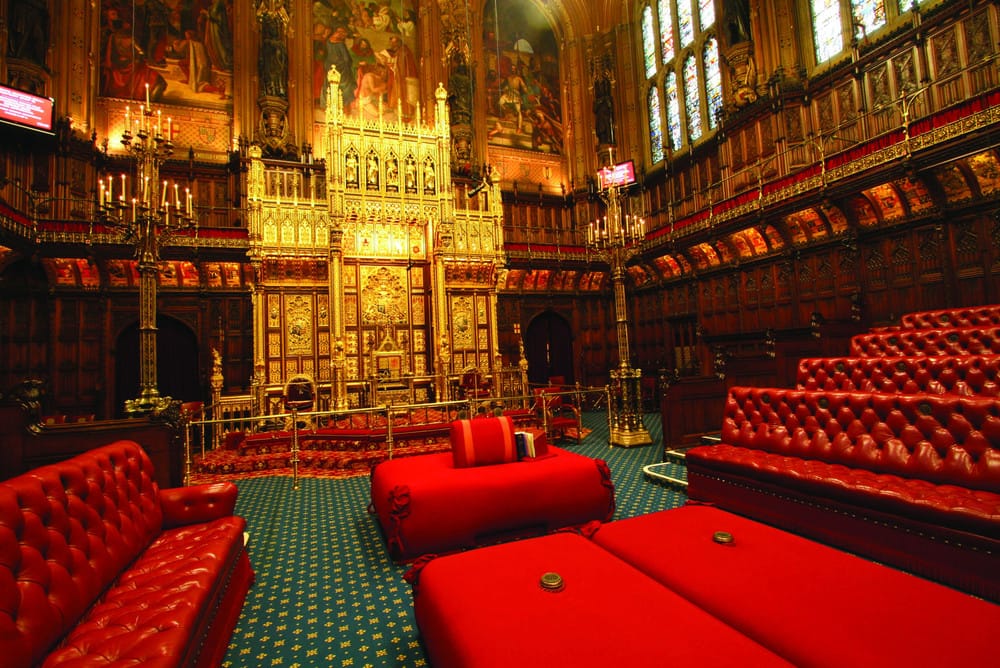
AM: Earlier this year you were a member of the Joint Committee appointed to conduct pre-legislative scrutiny on the Draft House of Lords Reform Bill. As well as sitting on the committee, you were a signatory to the Alternative Report that was published. What prompted you and eleven other members to produce this report?
LN: A number of reasons, mainly the deficiencies with what the Government had brought forward in terms of their Draft Bill. We were limited, we had to deal with the bill before us, so it wasn’t a case of looking at the issue from first principles, reform [by] electing the second chamber was taken as a given, and that’s never really been addressed in terms of “Why?”. We had to deal with the detail of the bill. The detail of the bill itself was fairly… deficient… for all sorts of reasons. It’s a bad bill, lots of problems with it, including the attempt to try and ensure the primacy of the House of Commons, in relation to the Lords. The way they try to do that through Clause 2 was inadequate, and that wasn’t just the view of those who signed the Alternative Report, it was the view of the whole committee. It was fairly unanimous. That was a particularly serious problem. There are others as well. So the report was flawed, our Joint Committee report drew attention to that, but the alternative report went further because we actually questioned the need for electing the second chamber and felt the need to stand back and look at the role of the House of Lords as part of Parliament and what they expect of Parliament in our political system. My argument is that the bill looks at it from the wrong end of the telescope. It’s dealing with composition without addressing form, and you need to start with what we expect the institution to do, then you create the people to carry out the specific tasks you expect of it. Not the other way round.
AM: How would you respond to comments, such as those from Lord Ashdown, that there are only a very few other chambers in the world which are non-elected? Do we want to be, as he puts it, in such company as Belarus, Bahrain and Yemen?
LN: Well, we’re not. As I’ve pointed out to him, he’s wrong. In many respects, he’s blatantly got his figures wrong, both in terms of elected second chambers and indeed where they are elected, the relationship between them and the first chamber. So, bit flawed. There’s only a minority of second chambers that are wholly elected, a minority are appointed, and the others are a mixture of them in form of composition. It varies, so you can’t generalise particularly, but we can say we are not the only appointed second chamber. And even if we were the only appointed second chamber, that’s not an argument against having an appointed second chamber if you can demonstrate the benefits that derive from it. To say that there are elected second chambers elsewhere and they work is not to suggest in any way that they are better than the second chamber we have and the job that it does.
AM: Given that you are against the abolition of the House in its current form, what sort of reforms would you like to see introduced to the chamber?
LN: There are quite a lot of changes that can be made, because I’m in favour of reform but against election. I want it to be effective but not elective. It’s really strengthening the existing House in what it does, because it does add value to the political process. However, an elected chamber arguably is value detracting as there is no obvious benefit that would derive from it in terms of what it would do, because, as electors would be voting for the second chamber on exactly the same basis as they vote the first chamber, there would be an element of redundancy in the process. So it’s a case of strengthening what it currently does. Some of that can be achieved by the House itself without legislation, and we’ve already strengthened our resources over the years and we continue to do it. We are looking at a lot of ourprocedures; [to] see how those could be strengthened. We’ve made some changes [and] we’re discussing more. Also, enhancing our use of specialist committees, I want to see more evidence taking in dealing with legislation. But a number of changes require legislation – putting the Appointments Commission on a statutory basis, getting rid of the by-election of hereditary peers making them de facto Life Peers. We want to have provision for expulsion of some members, particularly if they have committed serious criminal offences, so to bring us into line with the procedures and rules of the Commons, but also, if necessary, to be able to expel members. I’d like to see a cap on the numbers as well (we’re quite a large chamber), and make provision for those who don’t attend, or have more direct methods to reduce the number of members. Those changes, I think, would enhance what the House does. I think what it does, it does well; particularly, legislative scrutiny, the difference it makes there to legislation, but you must never be complacent in what we do well, we could do even better. So I think we need changes, and that’s what we’re exploring at the moment.
AM: Frequently, over the last decade or so, there has been considerable appetite for constitutional reform, recently the Fixed Term Parliament Act, and with the last Government, the abolition of the Law Lords and expulsion of the majority of the hereditary peers. Does this illustrate the dominance of the executive, and as such, were proposals properly scrutinised? If not how would you prevent that from occurring again? LN: Well, to some extent they were, it depends on political will, but part of the problem is the government itself not fully appreciating the nature of constitutional change and that it should be subject to a somewhat different procedure than that for ordinary legislation. Getting the government to accept this is proving difficult, but what they’ve got to accept is that the constitution is bigger than the government. That is [to say that] government is the creature of the constitution and not the other way round. So they need to accept more that the Lords fulfil quite a good role, ultimately it’s up to the Commons, but the Lords have been able to make a difference because of the scrutiny that is afforded, both when the legislation is going through, and through its committee work. The Constitution Committee in the House of Lords has been very influential in terms of the reports it has been producing on some of the changes going through, and achieving some change and influencing the House on the stance it takes on them. Fixed Term Parliaments, a particular success in the last session on the Public Bodies Bill, which was changed quite dramatically in light of the work we did. So the Lords does quite a good job in that respect, but we are working hard to get the government to enhance, to look at the way it deals with constitutional measures and accept they are qualitatively distinctive and needs to be treated as such.
AM: I have a couple of questions from our readers. The first one I have is aside from how one would get your job, if you could draw up a constitution based on three principles, what would they be?
LN: I’m a bit wary of having a codified constitution and therefore … it depends on principles. I can tell you about the basic tenets, in terms of form, but that would be to keep what we’ve got. Given the nature of our constitution, where we tend to go for what is known as positive constitutionalism, rather than like the States, which goes for negative constitutionalism. That is where there are certain principles, which take precedence, political principles that transcend all of the majority. We go somewhat towards the other end where the will of the majority will prevail, but tempered by Parliament and that’s important. So, the three principles. One would retain the principle of Parliamentary Government, of government being chosen through the House of Commons and being answerable. That comes onto the second principle, which is accountability. To add to the core principle, accountability, which the present system delivers because we have core accountability through elections to the House of Commons. Governments are chosen through elections to the House of Commons, and are answerable through elections to the House of Commons. That is fundamental. In this country, we know who is responsible for public policy, in a way that American citizens can’t always identify who’s responsible for American public policy. What if Congress overturns what the President wants? There’s the question of accountability. So, Parliamentary Government, or if you like, Parliamentary Accountability. Now… choice as to what would come next in our… arrangement. Because one could go with the principle of maintaining a Union state, that’d possibly be one, where it is strengths from each part of the Union coming together, thus within a unitary state. So, I suppose those are the main ones, and an ancillary to core accountability of course, is maintaining the primacy of one legislature, having an elected chamber, which is necessary in democracy and sufficient.
AM: Another question was whether the omnipotence of the fifty per cent plus one majority is a weakness of British Democracy?
LN: No. There are all sorts of problems with supermajorities under our system, because they can be amended by legislation anyway, which would need an ordinary majority. No, I don’t think there is a problem in our system, because there is core accountability, as I say, the government’s elected through an elected House of Commons, and is answerable to the elected Commons. In other words, the government knows it can be turned out at the next election, so even if it did just win with fifty per cent plus one, it knows it won’t be normally able to engage in political musical chairs after the next election, as some systems can. It’s that aspect which makes Government therefore responsive in between elections, which is another value to the system. So it’s not, it tempers the arrogance of governments: if it ignores what the public think between elections, it’s going to lose the next election. So it is tempered by that. So I think the way it comes together is, when you think about it, you have core accountability, you have effectiveness because the government can govern. It can deliver on the coherent programme of public policy, but it is also responsive between elections. It knows it wants to win the next election. And members of both Houses are more independent than they used to be – certainly the Commons – MPs [are] more willing to vote against their own side. So it tends to come together. You have accountability, effectiveness, responsiveness, in a way that few other systems have.
AM: Thank you for your time, Lord Norton.
LN: Thank you.
Guest talk: Lord Norton
11th December at 7pm Room G.01, RSM Free for Imperial students Brought to you by Conservative, Debating, and History societies.

